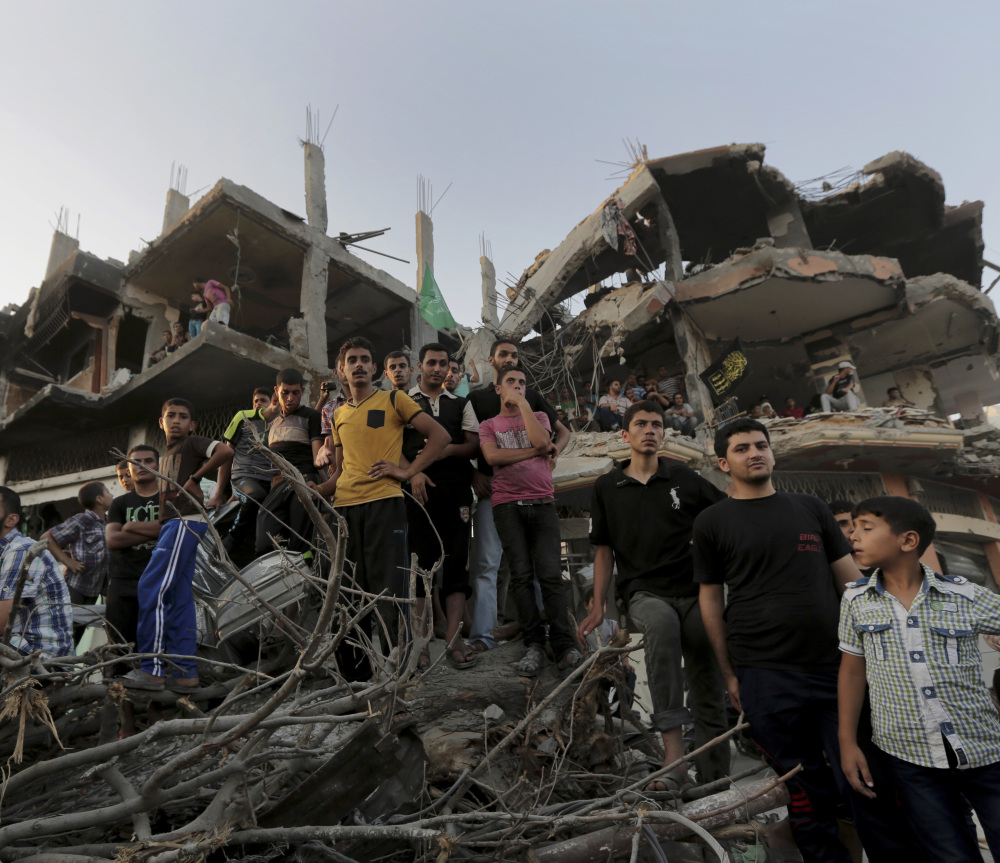JERUSALEM — Both Israel’s prime minister and Hamas declared victory Wednesday in the Gaza war, though their competing claims left questions over future terms of their uneasy peace still lingering.
Israeli Prime Minister Benjamin Netanyahu’s comments, delivered in a prime-time address on national television, appeared aimed at countering critics of the war, with both hard-liners in his governing coalition, as well as residents of rocket-scarred southern Israel, saying the war was a failure because it did not halt Hamas’ rocket attacks or oust the group from power.
Masked Hamas militants carrying heavy weapons gave their own address upon the rubble of one destroyed Gaza neighborhood, though their own major demands won’t be addressed until indirect talks with Israel resume in Cairo.
Israel and Hamas agreed to an open-ended truce Tuesday, with each side settling for an ambiguous interim agreement in exchange for a period of calm. Hamas, though badly battered, remains in control of Gaza with part of its military arsenal intact. Israel and Egypt will continue to control access to blockaded Gaza, despite Hamas’ long-running demand that the border closures imposed in 2007 be lifted.
Hamas is seeking an end to the Israeli blockade, including the reopening of Gaza’s sea and airport. It also wants Egypt to reopen its Rafah border crossing, the territory’s main gateway to the outside world. Under the restrictions, virtually all of Gaza’s 1.8 million people cannot trade or travel. Only a few thousand are able to leave every month.
Israel, meanwhile, wants Hamas to be disarmed.
“Hamas was hit hard and it received not one of the demands it set forth for a cease-fire, not one,” Netanyahu said. He said Israel “will not tolerate” any more rocket fire, and would respond “even harder” if the attacks resume.
Addressing the future of Gaza, Netanyahu said that should Palestinian President Mahmoud Abbas “choose peace,” he would be happy for the Palestinian leader to regain control of the coastal enclave, which the Islamic militant group Hamas has ruled since it routed Abbas’ forces in 2007. Netanyahu indicated that so long as Hamas was in power, reaching a negotiated solution to the conflict with the Palestinians was impossible.
Critics have said that Netanyahu did not go far enough to topple Hamas and that the war, meant to end incessant rocket fire on communities in Israel’s south, changed little on the ground at the cost of 70 people killed on the Israeli side, all but six soldiers. The war marked the third round of fighting since Hamas seized power in Gaza.
“Both sides did not exactly want this campaign, both sides made all possible errors dragging them into it, and both sides find themselves today returning to square one, where they were at the start of the warfare,” wrote Alex Fishman in the Yediot Ahronot daily newspaper.
Send questions/comments to the editors.



Success. Please wait for the page to reload. If the page does not reload within 5 seconds, please refresh the page.
Enter your email and password to access comments.
Hi, to comment on stories you must . This profile is in addition to your subscription and website login.
Already have a commenting profile? .
Invalid username/password.
Please check your email to confirm and complete your registration.
Only subscribers are eligible to post comments. Please subscribe or login first for digital access. Here’s why.
Use the form below to reset your password. When you've submitted your account email, we will send an email with a reset code.